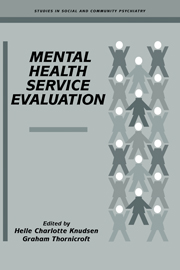Book contents
- Frontmatter
- Contents
- List of contributors
- Foreword
- Preface
- Part I INTRODUCTION
- Part II COMPREHENSIVE SERVICE EVALUATION PROJECTS
- Part III METHODS: MEASUREMENT, STRATEGIES AND NEW APPROACHES
- Part IV SYSTEM-LEVEL RESEARCH
- Part V PROGRAMME-LEVEL RESEARCH
- 16 Randomised controlled trials of programmes
- 17 Individual patient outcomes
- 18 Caregiving in severe mental illness: conceptualisation and measurement
- 19 Needs assessment
- Part VI HEALTH ECONOMICS IN MENTAL HEALTH
- Index
16 - Randomised controlled trials of programmes
from Part V - PROGRAMME-LEVEL RESEARCH
Published online by Cambridge University Press: 05 August 2016
- Frontmatter
- Contents
- List of contributors
- Foreword
- Preface
- Part I INTRODUCTION
- Part II COMPREHENSIVE SERVICE EVALUATION PROJECTS
- Part III METHODS: MEASUREMENT, STRATEGIES AND NEW APPROACHES
- Part IV SYSTEM-LEVEL RESEARCH
- Part V PROGRAMME-LEVEL RESEARCH
- 16 Randomised controlled trials of programmes
- 17 Individual patient outcomes
- 18 Caregiving in severe mental illness: conceptualisation and measurement
- 19 Needs assessment
- Part VI HEALTH ECONOMICS IN MENTAL HEALTH
- Index
Summary
Introduction
The objective of this chapter is to provide a functional frame of reference to those who want to familiarise themselves with the basic ideas behind randomised controlled trials (RCT), and with the practical problems and technicalities involved. Emphasis is on RCT of treatment programmes in a clinical context (RCT-P: P for such programmes) rather than on single interventions in the laboratory or laboratory-like situations. The chapter should be of help to those who want to evaluate published randomised clinical trials and research proposals, and to those intending to conduct such a trial.
Underutilisation of non-medication RCT in psychiatry will be discussed. Basic terms are introduced and defined. The aims pursued by the randomisation procedure are described. Several technical issues are addressed: the number of patients required as implied by power analysis, allocation of equal or unequal numbers of patients to the control and experimental condition, schemes of randomisation, and blinding. The differences between so-called management trials (RCT-P are such trials by nature) and explanatory trials are explicated. Specific problems of analysis in RCT-P as reflected by the concepts of ‘intention-to-treat analysis’ and ‘as treated analysis’ are referred to. Attention is drawn to two criteria by which each RCT should be judged: internal validity and generalisability. The chapter ends with a general appreciation of the position of RCT-P in psychiatry.
Underutilisation of randomised controlled trials in Psychiatry
RCT are the scientific standard to settle claims concerning the superiority of one intervention over another (e.g. Pocock, 1987). There is a growing consensus in medicine that new major therapies should be tested rigorously, preferable by RCT. Their application in psychiatry is, however, extremely limited, excepting the evaluation of psychotropic medication. The number of trials in which, for example, inpatient psychiatric care for the acutely mentally ill has been soundly tested against alternative interventions is surprisingly small. Up till now no more than eight randomised trials have been conducted in which inpatient care for the acutely mentally ill stood the test against day treatment. Between the first and last trial in this series nearly 30 years elapsed. The total number of patients involved in the trials is about 1000; the generalisability of most studied samples was very limited (Kluiter et al., 1992).
- Type
- Chapter
- Information
- Mental Health Service Evaluation , pp. 259 - 280Publisher: Cambridge University PressPrint publication year: 1996
- 1
- Cited by



